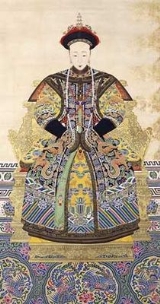
Empress Xiao Mu
Encyclopedia
Empress Xiaomucheng was the first consort of the Daoguang Emperor
of the Qing Dynasty
.
clan, which was under the Bordered Yellow Banner of the Eight Banners
. Her personal name is unknown. Lady Niuhuru's father was Buyandalai (布顏達賚), a Duke of the Third Class (三等公) who served as Minister of Revenue
(戶部尚書). Her birth date is not found in historical records. She was first mentioned in 1796 when she married Mianning on December 22 that year.
Lady Niuhuru did not have any children. She died in 1808 and was interred in the Eastern Qing Tombs
, Zunhua
.
When Mianning ascended to the throne in 1820 as the Daoguang Emperor
, he granted Lady Niuhuru the posthumous title of "Empress Xiaomu". In 1828 there was a leak in the Eastern Qing Tombs, resulting in flooding. In the following year, Lady Niuhuru's coffin was temporarily moved to the Baohua Ravine Hall (寶華峪正殿). In 1835 her coffin was to the Muling Mausoleum in the Western Qing Tombs
, Hebei
.
Daoguang Emperor
The Daoguang Emperor was the eighth emperor of the Manchurian Qing dynasty and the sixth Qing emperor to rule over China, from 1820 to 1850.-Early years:...
of the Qing Dynasty
Qing Dynasty
The Qing Dynasty was the last dynasty of China, ruling from 1644 to 1912 with a brief, abortive restoration in 1917. It was preceded by the Ming Dynasty and followed by the Republic of China....
.
Biography
Empress Xiaomucheng was of the Manchu NiuhuruNiohuru
The Niohuru or Niuhuru Clan were a powerful Manchu clan belonging to the Plain Red Banner during the Qing dynasty in China...
clan, which was under the Bordered Yellow Banner of the Eight Banners
Eight Banners
The Eight Banners were administrative divisions into which all Manchu families were placed. They provided the basic framework for the Manchu military organization...
. Her personal name is unknown. Lady Niuhuru's father was Buyandalai (布顏達賚), a Duke of the Third Class (三等公) who served as Minister of Revenue
Three Departments and Six Ministries
The Three Departments and Six Ministries system was the main central administrative system adopted in ancient China. The system first took shape after the Western Han Dynasty , was officially instituted in Sui Dynasty , and matured during Tang Dynasty...
(戶部尚書). Her birth date is not found in historical records. She was first mentioned in 1796 when she married Mianning on December 22 that year.
Lady Niuhuru did not have any children. She died in 1808 and was interred in the Eastern Qing Tombs
Eastern Qing Tombs
The Eastern Qing Tombs are an imperial mausoleum complex of the Qing Dynasty located in Zunhua, 125 kilometers northeast of Beijing. They are the largest, most complete, and best preserved extant mausoleum complex in China...
, Zunhua
Zunhua
Zunhua is a county-level city under the administration of Tangshan, Hebei, China. Historic sites include the Eastern Qing Tombs .-Administrative Divisions:Towns:...
.
When Mianning ascended to the throne in 1820 as the Daoguang Emperor
Daoguang Emperor
The Daoguang Emperor was the eighth emperor of the Manchurian Qing dynasty and the sixth Qing emperor to rule over China, from 1820 to 1850.-Early years:...
, he granted Lady Niuhuru the posthumous title of "Empress Xiaomu". In 1828 there was a leak in the Eastern Qing Tombs, resulting in flooding. In the following year, Lady Niuhuru's coffin was temporarily moved to the Baohua Ravine Hall (寶華峪正殿). In 1835 her coffin was to the Muling Mausoleum in the Western Qing Tombs
Western Qing Tombs
The Western Qing Tombs are located some southwest of Beijing in Hebei province near the town of Yixian. The Western Qing Tombs is a necropolis that incorporate four royal mausoleums where seventy-eight royal members in all are buried...
, Hebei
Hebei
' is a province of the People's Republic of China in the North China region. Its one-character abbreviation is "" , named after Ji Province, a Han Dynasty province that included what is now southern Hebei...
.
Posthumous title
Empress Xiaomucheng's full posthumous title is:- Empress Xiaomuwenhouzhuangsuduanchengkehuikuanqinfutianyushengcheng
(孝穆溫厚莊肅端誠恪惠寬欽孚天裕聖成皇后)

